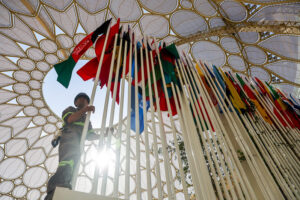- 1.5°C future on the line: Why nations must cut emissions now or lose target
- IMF Growth Forecasts: BRICS to Lead the World in the Next 5 Years
- Vantage Capital seals exit from PickAlbatros Hotels after $18.4M pandemic boost
- Madica backs Earthbond in bold pre-seed bet on sustainable solutions
- Venture capital and debt drive growth in Kenya’s agri-tech sector
- Sustainability Week Africa: Pioneering change amidst climate challenges
- Refugee Crisis in Chad as War and Hunger in Sudan Drive Thousands Across Border
- Senegal 2050: A Blueprint for Economic Transformation
Author: Maureen Murori
East Africa has since late 2019 been fighting swarms of desert locusts which have posed a serious threat to crops and grazing across the region.
The locust plague In Kenya is the worst in 70 years. In the last two months, new swarms have been breeding and hatching leaving farmers devastated as they try to cope with the negative effects from previous pests not to mention the dry spells and floods that hit the region further destroying crops.
“We expect the worst if the young hatch in March and April,” Kelvin Shingles, Kenya Country Director for German Agro Action (Deutsche Welthungerhilfe) said in a press release.
In Ethiopia, Somalia and Kenya, it is reported that up to 38 percent of cropland and 48 percent of pastureland have been affected. 69 percent of households have also suffered losses due to the plague according to the Southern Africa Food and …
According to the United Nations International Labour Organisation (ILO), reduced working hours or job losses as a result of COVID-19 crisis cost the world approximately 255 million jobs in 2020.
Although the full economic impact of the current crisis is still not entirely understood, many people have suffered one blow or another as a result of the pandemic.…
Following COVID-19 pandemic-related travel restrictions, it is predicted that up to millions of African jobs will be lost in the aviation and aviation-related industries, according to a report by Air Transport Action Group. The report revealed that 4.5 million jobs out of Africa’s 7.7 million aviation-related employment would be lost. Up to 172,000 jobs in the aviation sector alone have been lost by the end of 2020.
Subsequently, the aviation sector in Africa is estimated to fall by 58 percent, that is US$37 billion, compared to pre-pandemic levels.
Moreover, the Organisation for Economic Co-operation and Development (OECD) Employment Outlook indicates that the effect of the containment measures is worse than the 2008 financial crisis. The result of the current crisis has led to “an exceptional drop in activity and unprecedented job losses. Up to 10 times fewer hours were worked in some countries, compared with
A month after the worldwide lockdown, border closure and major travel restrictions within and between countries resulted in over 90 per cent decrease in the number of air passengers. Land and water transportation also experienced cancellations as people were cautious of crowded places.
According to the International Air Transport Association (IATA) analysis global passenger demand fell by 14.1 per cent in February 2020 resulting from the effects of the corona virus on Asia-Pacific markets.
“Airlines were hit by a sledgehammer called COVID-19 in February,” IATA’s Director General and CEO, Alexandre de Juniac said in an article by International Airport Review. “Borders were closed in an effort to stop the
Covid-19's impact on transportation in East Africa has been the greatest impediment to trade in the entire region. Due to the multiple medical tests that drivers are forced to undertake, the wait period has been a critical hinderance on goods being delivered on time. This has drastically changed much of the supply of goods and services from the two key ports of the region, namely the Mombasa Port in Kenya and the Dar es Salaam Port in Tanzania.
With the global pandemic continuing its tirade, no corner in the world is spared. Trade in Eastern Africa has severely been affected by internal and regional barriers inhibiting competitiveness of regional goods and services.
Prior to the outbreak of COVID-19, for example, the port of Mombasa, the busiest in East Africa, handled approximately 27 million tonnes of cargo and processing more than one million containers. Following the pandemic, however, the
Since the September 1995 United Nations’ Fourth World Conference on Women, one would think that the world would have achieved gender parity in all areas and sectors.
However, while there have been important gains over the years, there are still areas that need more work and revised strategies to reduce the gap and meet the target.
Following the world largest global gathering on gender equality in Beijing, China, 25 years ago, member states agreed that the meeting would be a basis for “comprehensive and transformative agenda for gender equality and the empowerment of women and girls.”
A recent report: Gender Equality: Women’s Rights in Review 25 years after Beijing aimed at taking stock of progress has concluded that the implementation has flopped short of the initial potential.
The review by the United Nations Women (UN Women), notes that although the last 25 years have recorded growth in some areas…
Before the economic shock of COVID-19, world merchandise trade in 2019 was already slowing down due to trade tensions and decelerating economic growth.
According to the World Trade Organization (WTO), “the dollar value of world merchandise exports in 2019 fell by 3% to US$18.89 trillion”. Overall, world trade is expected to continue falling and will range between 13% and 32% in 2020, as the health crisis continues to disrupt world economies.
In addition to the economic disruption, so far, Coronavirus has left more than 200,000 people dead across the world, more than the fatalities recorded in the World War 11, as observed by the UN Secretary-General, Antonio Gueterres. The effects of the ‘Great Lockdown’ as perceived by the International Monetary Fund (IMF), is far beyond the effects of the 1930s Great Depression. With exception of businesses dealing in pharmaceuticals, life-saving amenities
The job market is ever dynamic; continuously changing as a result of socio-economic and technological development. In recent months however, the changes experienced are neither as a result of economic nor technological advancement, but rather, the health crisis that has altered the daily lives of people around the world.
One of the major effects of COVID-19 on the labour market is the loss of jobs for hundreds of millions of people. In big economies, workers are benefiting from unemployment claims, but the same cannot be seen in developing countries in Africa where governments are grappling with means to mitigate the effects of the current pandemic.
Predictions from the UN’s International Labour Organization (ILO) show that up to “1.6 billion workers in the informal economy – that is nearly half of the global workforce – stand in immediate danger of having their livelihoods destroyed.”
According to the ILO Monitor
The dream of a world without hunger seemed achievable three years ago. However, with increasing challenges such as those recorded recently like the locust invasion and the novel Corona Virus (COVID-19) that is still wrecking lives across the globe, the future looks bleak.
Africa accounts for the highest number of people suffering acute food insecurity due to conflicts and tensions between communities.
According to the 2020 Global Report on Food Crisis (GRFC 2020): “In East Africa, armed conflicts, intercommunal violence and other localized tensions continued to affect peace and security.”
Moreover, “the upheaval that has been set in motion by the COVID-19 pandemic may push even more families and communities into deeper distress, António Guterres, Secretary-General of the United Nations, added in the Forward of the report.
Also Read: Crop insurance to ensure food security and poverty reduction
The global food policy report published April
The outbreak of COVID19 has turned the world as we knew it into a bizarre nightmare that we cannot awaken from.
From governments to businesses and people, the impact of the coronavirus (COVID-19) is being felt by all around the world. In the weeks following the announcement that the novel Corona virus was indiscriminately attacking the old and the young, the rich and the poor, nations put measures in place to keep the virus at bay.
Across the world, while the number of coronavirus cases is slowing in China, elsewhere, cases are spilling over even as governments employ measures to navigate the complicated terrain. Thousands of people have lost employment leading to reduced or no income to survive on during the lockdown.
In addition to social distancing, limited travelling within and between towns, economies and governments in East Africa have encouraged moving away from cash and adopting digital payments. This …




